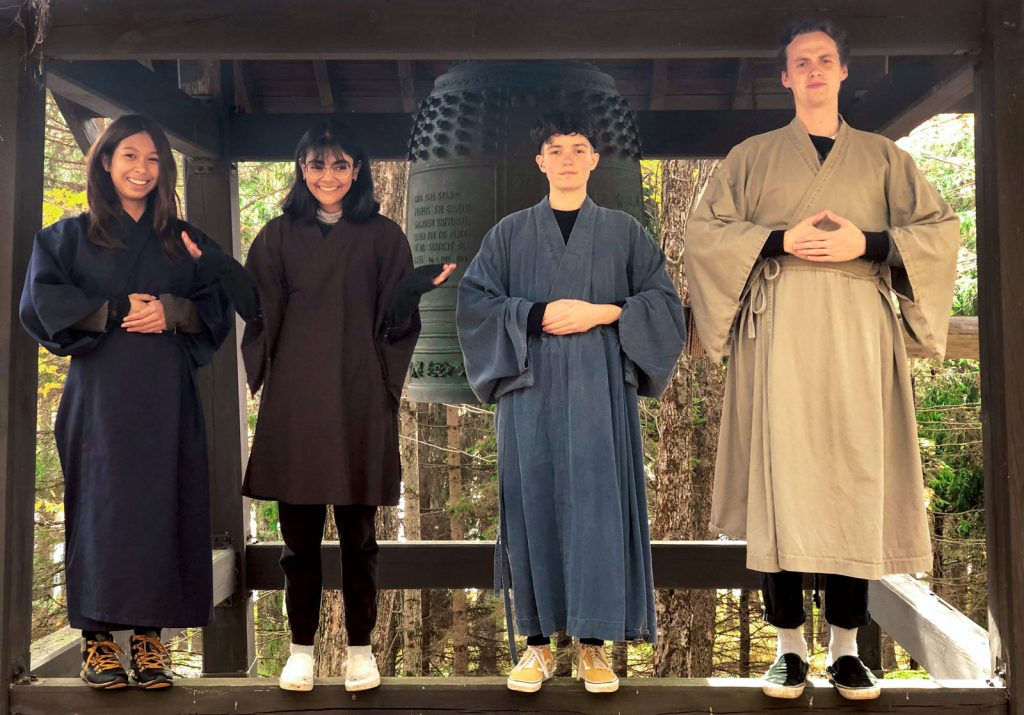For years, members of the Hyde Park Zen Group have gathered each Wednesday to spread out their cushions around the altar in Rockefeller Memorial Chapel, a cavernous space modeled after a medieval cathedral with soaring vaulted ceilings, stained glass windows, and a 200-foot bell tower.
They sit together for half an hour, with a dharma talk following. It’s a treasured interval of tranquility for students, faculty, and staff at the University of Chicago, a school so notorious for its academic rigor that it is often referred to as “the place where fun comes to die.”
“I’m a big-time monkey mind guy,” says Alex Peltz, a student in the master of divinity program who joined the Zen group as an undergrad and now helps lead it. “Here at UChicago I have a lot of thinking to do, which can get me into trouble,” he explains. “To have 30 minutes a week where I don’t have to think at all—it’s a very important tool.”
For students like Peltz, campus Buddhist organizations offer a refuge from the pressures and insecurities of college life and, for some, open the door for a deeper exploration of life’s meaning. Most of these student groups are nonsectarian in spirit, although they often have a close relationship with a local sangha.
“You can almost feel the relief in their bodies as they sit there: ‘Oh, it’s safe to be here, I can be vulnerable,’” says Brian Taylor, a senior member at Ancient Dragon Zen Gate, a Soto Zen temple on Chicago’s North Side, who coordinates the campus group. “They don’t have preconceptions. They have a kind of beginner’s mind that’s refreshing. They don’t show off their knowledge of Buddhism—they really ask questions.”
In April, the sitting group moved its zazen [sitting meditation] sessions online in response to the COVID-19 outbreak, as did the Ancient Dragon Zen Gate sangha, where a “virtual zendo” began offering daily meditation sessions and a dharma talk on Sundays.
“They are very smart kids. At the same time, they are genuinely searching for purpose or meaning.”Students are often drawn to Buddhist practice because they sense its potential to alleviate the distress they’re experiencing, says JoAnn Cooke, the Buddhist chaplain at Syracuse University in central New York State.
“Students are basically very lonely and disconnected from each other,” Cooke says. “There’s just so much to do and so much to take on as a college student. The drama of their world is this competitive, weird, unknowing way of relating to people.”
The university’s Buddhist Meditation Association history stretches back more than 40 years, when members helped found the Zen Center of Syracuse, where Cooke is a senior student. The group rapidly adapted when the Syracuse campus closed because of the COVID outbreak, Cooke says. “We have two student-led meditations via Zoom on Mondays and Fridays,” she says. “They are going pretty well. We have been getting six to eight people on Mondays, not so many on Fridays.”
In New York City, the Columbia University Buddhist Association (CUBA) hosts weekly 30-minute meditation sessions, followed by presentations by teachers from various dharma traditions, says Reverend Doyeon Park, a Won Buddhist kyomunim [teacher] who has served as Buddhist chaplain since 2011.
“At Columbia they are very smart kids,” Park remarks. “At the same time, they are genuinely searching for their own purpose or meaning.” She regularly meets with students to answer their questions about Buddhism, and says the group serves primarily as a general introduction to the dharma. “If I see the student has an interest in a particular Buddhist tradition, I recommend a particular teacher or center for their own needs,” she adds.
CUBA vice president Kavin Chada says the group is competing with campus groups that attract participants by advertising mindfulness as a way to alleviate stress.
“My generation, in general, is very reluctant to hear about anything that sounds like religion,” Chada says. “We even talked about changing the name of the group. If you speak about mindfulness, people are very open to hearing about that. But I find if you want to go a little bit more deeply, usually people’s interest peters out. I think with the label of Buddhism it can be just scary.”
When the Columbia campus closed in March with COVID concerns, CUBA moved to hour-long online meditation sessions. “The main idea for us was to reposition ourselves to be a support system for the community at large,” Chada says. “It is an opportunity for everyone to come together rather than a source of significant insight in terms of meditation practice, which is what we usually try to provide.”
Back in Chicago, Howard Ruan, who uses the pronouns they/them, was already an Ancient Dragon Zen Gate regular when they enrolled in the University of Chicago Divinity School and started sitting with the Hyde Park group. Their Buddhist practice, they say, “has become profoundly more subtle and mysterious over time. It has become a structured time to just not be doing anything and paying attention to what happens.”
Attendees at the Rockefeller Chapel gatherings—including residents living near campus—take turns delivering dharma talks, according to Sara Lytle, a UChicago Divinity School graduate training to be a chaplain. “They tend to be on a range of subjects,” she says. “I did my dharma talk on the Therigatha, a collection of poems by early Buddhist women.”
Now in clinical pastoral training at Northwestern University, Lytle has fond memories of sitting with the Hyde Park group and stays in touch with members.
“It was definitely a really important part of my time at UChicago,” she says. “It was really nice to sit there.”
Correction (08/10/20): An earlier version of this story referred to Howard Ruan with the pronouns he/him. Ruan uses they/them pronouns.
Thank you for subscribing to Tricycle! As a nonprofit, we depend on readers like you to keep Buddhist teachings and practices widely available.
